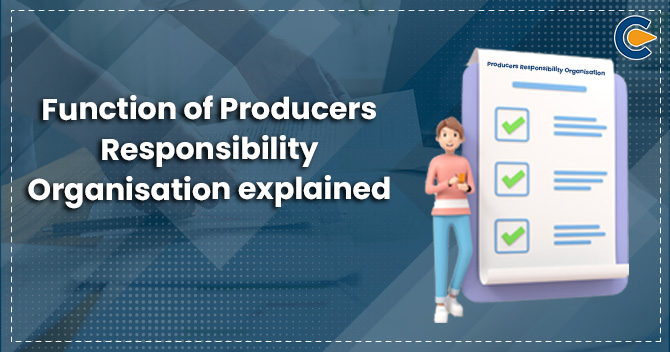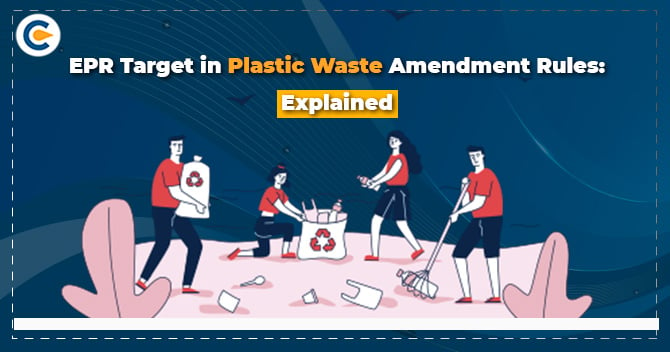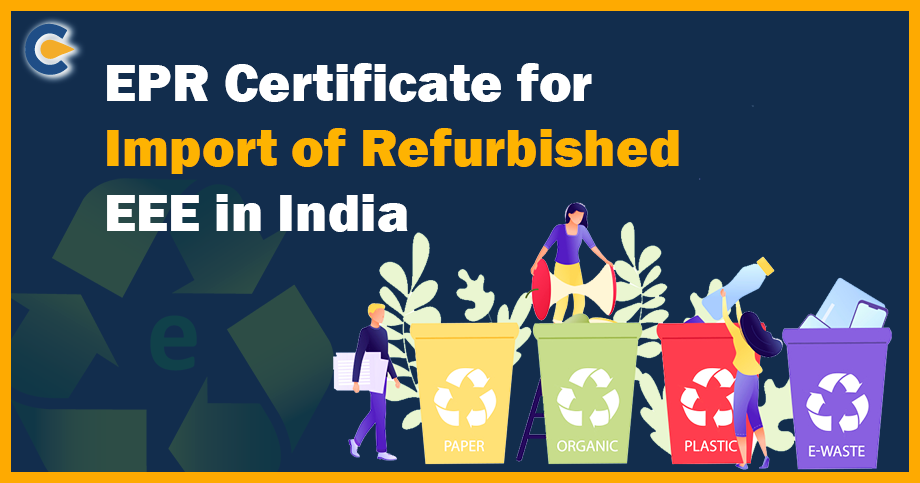Extended producer responsibility since the 1980s has been established as the key environmental norm among many countries with an aim to bestow producers with the liabilities and duty to determine the environmental impact of their appliances throughout the production process, starting from its design to the post-consumer stage. EPR is defined under OECD[1] as an environmental policy approach in which a producer’s responsibility for a product is extended to the post-consumer stage of a product’s life cycle.
EPR was implemented with the expectation that it lessens the burden on the government and authorities of waste management, decreases the amount of discarded waste and elevates the recycling rate.
One of the major functions of the Producers responsibility organization is to reduce the burden on the producers who are availing of the services of PRO.
For proper governance of the EPR policy government must establish proper and sustainable means for enforcing the extended producers’ responsibility which may include proper registration of producers, mandatory registration and certification of Producers’ responsibility organization along with appropriate sanctions.
Producers Responsibility Organization
Producer responsibility organization or PRO is the organization where the producers can delegate their EPR responsibilities regarding the collection and recycling of products as mandated by the plastic waste and E-Waste management rules. As per Rule 3(dd), “Producer Responsibility Organization” means a professional organization authorized or financed collectively or individually by producers, which can take responsibility for the collection and channelization of e-waste generated from the “end-of-life” of their products to ensure environmentally sound management of such e-waste.”
They are responsible for the viable collection and transportation of plastic or E-Waste in an environmentally friendly and sustainable way. Another main function of the Producer Responsibility organization helps the producers or manufacturers to achieve their mandated target set by the state pollution control board of that particular state.
In the extended producers’ responsibility model, the producers’ responsibility organization is one of the most important stakeholders responsible for setting up, designing, and maintaining a waste management system.
It was recorded that by the end of May 2020, India will have 34 producer responsibility organizations (PRO) registered under the stipulated rules with the name available in the public domain on the official website of the Central Pollution Control Board.
Different Producers’ Responsibility Organization Model
PRO can implement EPR through different models:-
- PRO As a Private Organization
- PRO as a non-profit Corporation
- PRO as a state-run institution/ Authority
However, the producers’ responsibility organization model does not impact the amount or proportion of plastic waste/E-waste to meet the obligations delegated to the producers by the state pollution control board.
Functions of Producers Responsibility Organisation
The most important functions of producers’ responsibility organization involve:-
- The producer’s primary responsibility is to achieve the stipulated goals set up by the state pollution control board for producers as part of fulfilling extended producers’ responsibility.
- Implementing a proper and sustainable collection mechanism for efficiently and effectively collecting the waste.
- Implementing the policy of buyback and taking back properly
- Managing and ensuring the environmentally friendly way of dismantling and recycling the waste collected
- Managing the documents and logistics
- Assisting the producers with the annual/quarterly returns filing as per stipulated provisions.
- The function of the producer’s responsibility organization also includes providing an effective EPR action plan as instructed by the legislation.
- Conducting various programs to spread general awareness regarding the collection and channelization of waste among producers/Consumers or bulk consumers.
- Collection centres/points are to be established by the Producers Responsibility Organisation. As per the recommendations published by the Central Pollution Control Board, this may entail the establishment of the collection godowns or the operation of warehouses.
- Ensure the traceability of e-waste collected and channelled, as well as the disposal of processed waste and end-of-life plastic garbage.
Along with these, PRO is also required to specify its capacity for handling waste, including collection, storage and the data on the recyclers it has contracts with to properly manage this waste.
Recognition and Registration of Producers’ Responsibility Organization
For registration and recognition of PRO, the owner had to primarily submit an application form to the central pollution control board as prescribed under the annexure part of the E-Waste and Plastic waste management rules. Although E-Waste management rules do not recommend any minimum obligation for registering Producers Responsibility Organisation, the plastic waste management rules do have minimum requirements, which include:-
- The producers’ responsibility organization should be registered by a statutory body.
- These organizations must have a minimum experience of five years in waste management, including municipal solid waste and plastic waste.
- They must be properly recognized and have success stories on the proper disposal of municipal solid waste and plastic waste.
- They must have TAN, PAN, and GST Numbers.
Nevertheless, of these minimum requirements, the Central pollution control board has the authority to properly scrutinize, verify, and examine the submitted application and make their decision accordingly. The Central pollution control board have 25 days to respond to the submitted applications. Once the registration is done, it will be valid for three years as per E-Waste management rules which can be renewed before 60 days of its expiry. If there are any discrepancies, the appeal shall be made to the central pollution control board chairman.
Challenges Faced By Producers’ Responsibility Organization
With multiple producer responsibility organizations emerging in India and constant changes in norms, it is expected that the market for these organizations will be favourable. However, in reality, the PRO sector is still struggling to find a place in India due to a lack of proper accountability, transparency, and legitimacy. The major challenges faced by the PROs include lack of sustainability or long-life commitment, lack of awareness among people and consumers, and lack of proper supervision in the waste management sector, which have led to corruption and malpractices. Lack of proper infrastructure and collection points are also the factors contributing to the failure and closure of many producers’ responsibility organizations in India.
Conclusion
To fulfil the EPR expectations, it is very important that the functions of the producers’ responsibility organization are properly implemented and solidify the inducements for sustainable products and packaging. Along with that, the policies need to be implemented at the individual level to avoid the dilution of the incentives. Furthermore, the Producers Responsibility Organisation structure should also include collaboration with the informal workers to increase the collection reach and reduce the waste generated as a result of the unorganized sector.
Read Our Article:CPCB Producer Responsibility Organization











